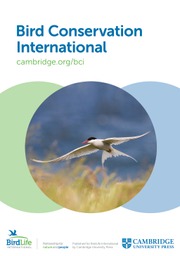Article contents
Changes in nesting numbers and breeding success of African White-backed Vulture Gyps africanus in north-central Botswana
Published online by Cambridge University Press: 24 April 2020
Summary
African White-backed Vultures were recently uplisted to ‘Critically Endangered’ by IUCN due to declines across their range. Poisoning is widely accepted as the major reason for these declines. Botswana supports a high number of this species (breeding pairs > c.1,200), but as yet no published information exists on their breeding success in the country. However, mass poisonings within Botswana and neighbouring countries have killed thousands of White-backed Vultures in recent years. We therefore expected that nesting numbers may have declined in this region if these poisoning events killed local breeding birds. We used information from aerial surveys conducted between 2006 and 2017 in Khwai and Linyanti, two important breeding areas for this species in north-central Botswana, to determine if there was any change in nesting numbers and breeding success of White-backed Vultures. Results showed an overall 53.5% decline in nesting numbers, with a greater decline in Linyanti than in Khwai. In both areas, breeding success was significantly lower in 2017 than it was 10 ten years earlier. We recommend that similar repeat surveys are continued to provide greater confidence in the trends of both nesting numbers and breeding performance. Population viability analysis suggested that if the productivity levels detected in 2017 were a true indication of current productivity levels for this population, and if recent high poisoning rates continue, this population could be extirpated from the area in the next 13 years.
Keywords
- Type
- Research Article
- Information
- Copyright
- © BirdLife International, 2020
References
- 4
- Cited by


